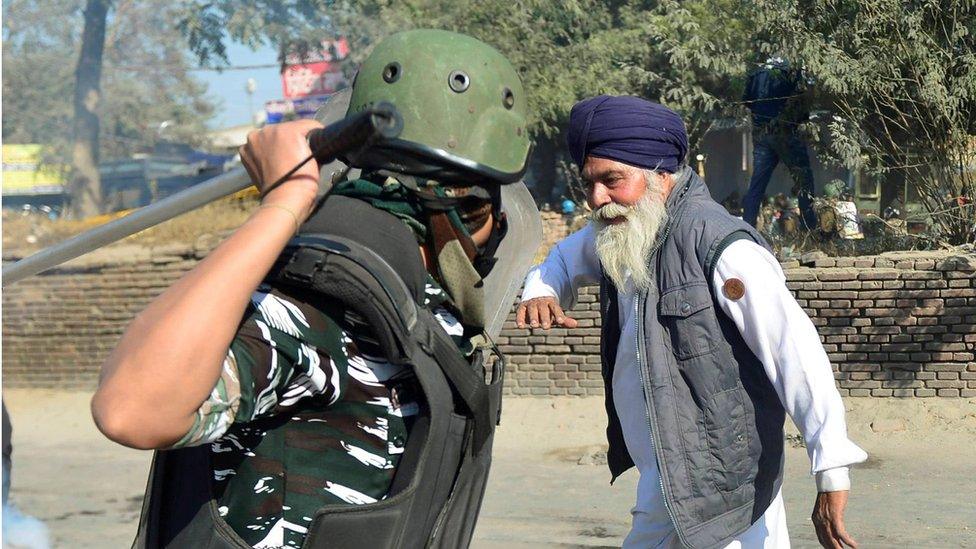2020 in pictures: The defining moments that changed Asia
- Published
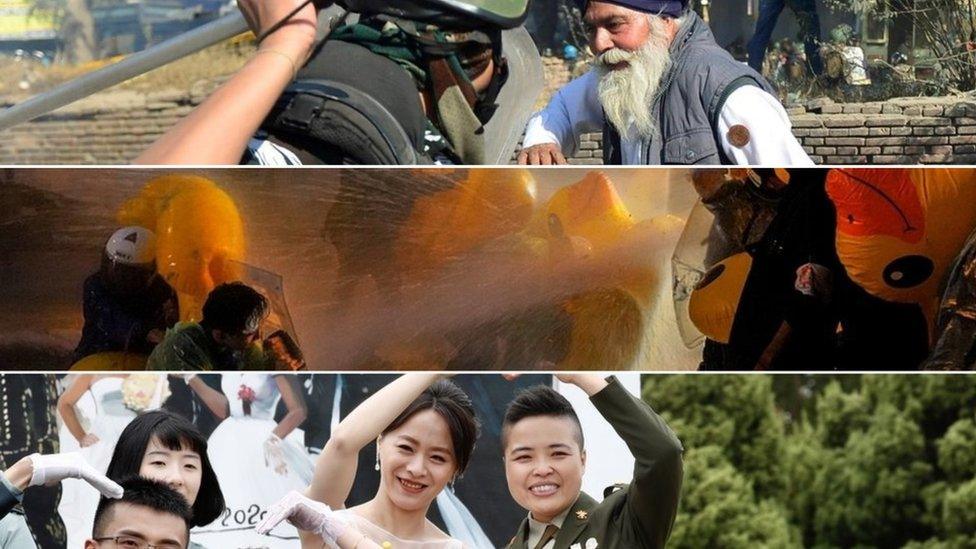
Few years are bound so universally by one event. But 2020 is one of them, synonymous worldwide with the pandemic.
Yet there was more to the last 12 months than the coronavirus.
We look back at 10 striking moments from Asia that had (almost) nothing to do with Covid-19.
24 February 2020: The worst communal riots to hit Delhi in decades
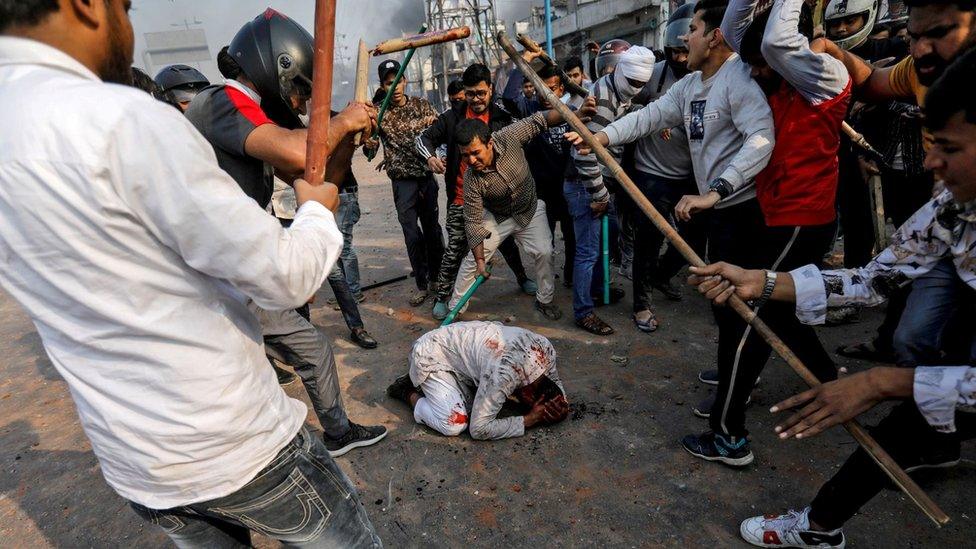
Young men chanting pro-Hindu slogans beat Mohammad Zubair with wooden sticks and metal rods
This picture of a Muslim man being viciously beaten by a Hindu mob became the defining image of religious riots in Delhi in February.
"No one who saw the photo thought I would survive," Mohammad Zubair, his head still wrapped in bandages, told the BBC on his return from hospital.
The attack, which took place during protests sparked by a new citizenship law, had left him for dead.
Yet despite the severity of his injuries, the 37-year-old survived.
More than 50 others did not, dying in violence that also drove thousands from their homes. It was the worst communal rioting to hit the Indian capital in decades.
But Mr Zubair said he hadn't lost faith in humanity.
"People who do such horrible acts cannot be from any religion," he said.
16 June 2020: When hopes for North-South peace went up in smoke
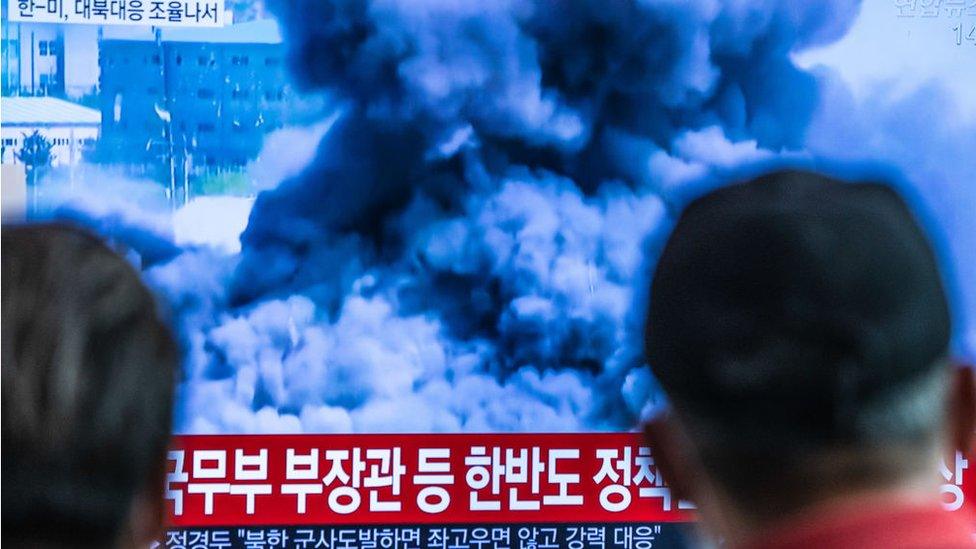
Commuters in Seoul watch a report showing Pyongyang blowing up a liaison office it shared with the South
It was a symbol of hope for a new era of peace.
A joint liaison office that allowed the two Koreas to talk directly for the first time since the Korean War.
In June it literally went up in smoke.
Pyongyang blew up the building, saying it wanted "human scum and those who have sheltered the scum to pay dearly for their crimes".
That was a reference to defectors in the South, who for years have sent propaganda leaflets into the North, usually by balloon or bottles in rivers.
The building itself - launched to great fanfare in 2018 on Pyongyang's side of the militarised border - had been empty since January due to Covid-19.
But the dramatic and carefully choreographed explosion still reverberated around the world.
It was a clear sign of Pyongyang's fury and, as one analyst put it, marked "an ominous turning point for the two neighbours".
10 August 2020: The arrest of Hong Kong's rebel mogul and a sweeping raid
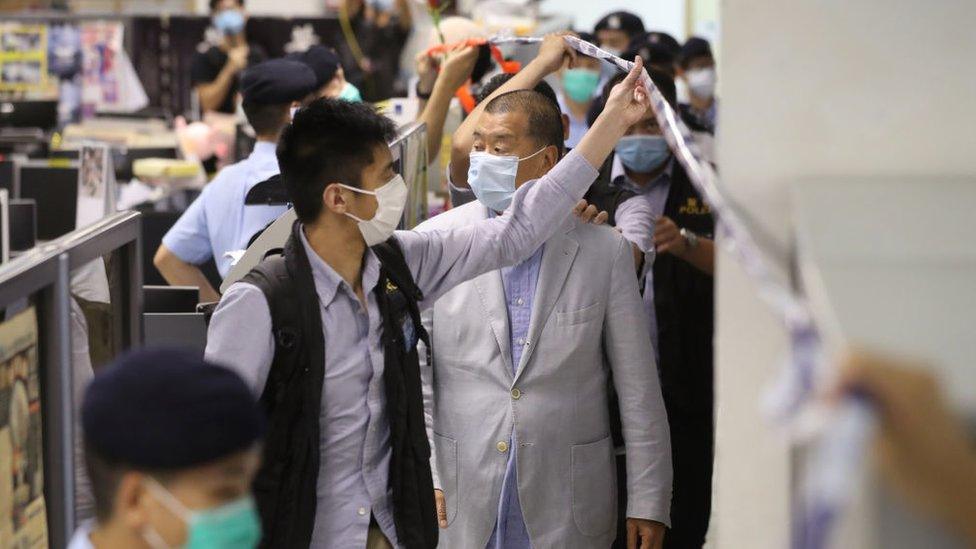
Police lead Hong Kong media tycoon Jimmy Lai through his Apple Daily headquarters after his arrest
For many Hong Kongers Jimmy Lai is a hero, a rare tycoon who has dared to challenge the soaring influence of Beijing.
That's why the mass raid on his publication Apple Daily - Hong Kong's biggest pro-democracy newspaper - stunned the city.
It started with Mr Lai's arrest early on 10 August.
The outspoken media mogul was no stranger to arrest. But this time it came under the controversial new national security law imposed by China - where he's viewed as a traitor - that could see the 73-year-old jailed for life.
More than 200 police officers searched his paper's headquarters as Mr Lai himself was paraded through the newsroom in unprecedented scenes livestreamed by its reporters.
Early the next morning Hong Kongers queued up at news stands across the city to buy the tabloid, which vowed to "fight on" in a defiant headline.
Earlier this month he was formally charged for endangering national security - led to court in handcuffs and a metal chain, external.
10 August 2020: The manifesto that shattered Thailand's biggest taboo

Panusaya Sithijirawattanakul delivers a manifesto urging reform of Thailand's powerful monarchy
She stepped onto a stage through a cloud of dry ice, to the cheers of thousands of students at one of Thailand's most prestigious universities.
But the spectacle of her entry paled in comparison to what she went on to say.
In 10 calmly-delivered points Panusaya Sithijirawattanakul laid out an open challenge to the monarchy.
By demanding the reform of an institution deemed untouchable - protected from criticism by a draconian lese-majeste law - she transformed the Thai protest movement.
"No-one in this world is born with blue blood. Some people may be more more fortunate than others, but no one is born more noble than anyone else," said the 21-year-old.
Her speech would have gone unnoticed in much of the world - but in Thailand it was electrifying.
Just a week earlier fellow activist, Anon Nampa, a human rights lawyer, was the first to break the royal taboo with a speech at a Harry Potter-themed democracy protest.
But it was the manifesto read by Ms Panusaya that pushed previously unuttered questions about the Thai king's vast power and wealth to the forefront of the student-led movement.
Last month she was one of several dozen young activists charged under the royal insult law - and faces 15 years in jail.
15 August 2020: Shoulder-to-shoulder at a pool party that stunned the world

This packed pool party in the former Covid-19 epicentre caught everyone's attention
It was the last place in the world you'd expect to see a massive pool party.
Thousands of revellers crammed into a Wuhan water park, swaying to the beats of an electronic music festival or lounging on rubber floats.
No masks, no social distancing.
In the city where the coronavirus first emerged months earlier local virus transmissions were down to zero.
Life appeared to be returning to normal. Cinemas, museums and parks were re-opening, a far cry from the silent streets emptied by January's original lockdown in Wuhan, which back then was an unprecedented sight.
Yet onlookers watched the packed pool with a mixture of awe and alarm, especially in those countries where the virus still raged.
China, which has largely brought Covid-19 under control unlike many parts of the western world, used the opportunity to make a point.
The pool party sends a message to the world, said the Beijing mouthpiece, The Global Times,, external that "strict anti-virus measures have a payback".
16 October 2020: The grieving mother whose treatment outraged the Philippines
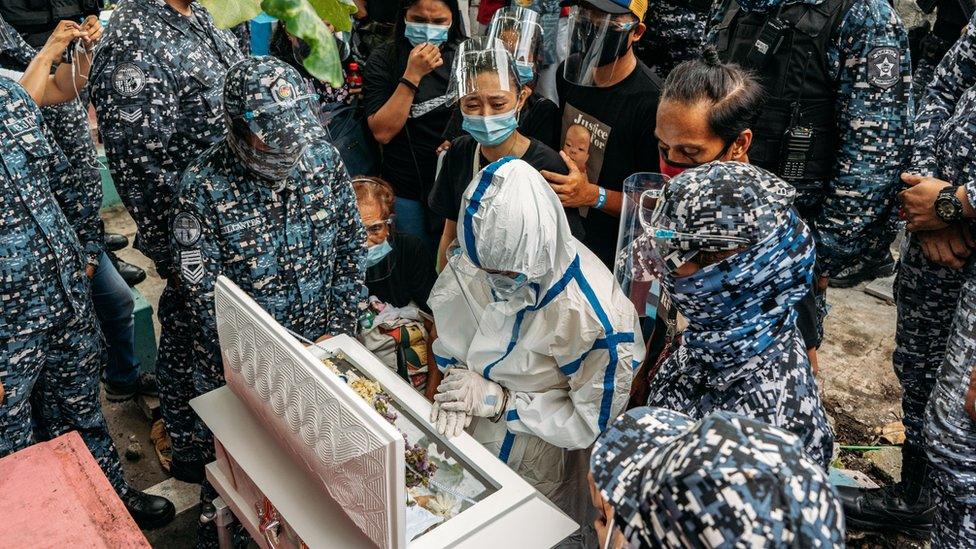
Political detainee Reina Mae Nasino says goodbye to her baby daughter
A young mother knelt before the body of her newborn to say her final goodbye - handcuffed and covered from head to toe in personal protective gear.
This image of Reina Mae Nasino - a political detainee released from prison under armed guard to attend her baby's funeral - agonised Filipinos.
It was the tragic end of an unsuccessful campaign to reunite the 23-year-old with her daughter.
Baby River was born in custody, separated from her mother at just over one-month-old - despite multiple pleas and legal challenges to keep the pair together.
Her health deteriorated soon after, but even when she was hospitalised Ms Nasino was not permitted to see her baby.
The next time she saw River was at her wake - the three-month-old baby died of pneumonia in October.
The case has raised critical questions about the rights of Filipino mothers in custody and sparked widespread outrage - with many saying the system had failed both Ms Nasino and her child.
23 October 2020: A Komodo dragon faces off against a truck on a remote island
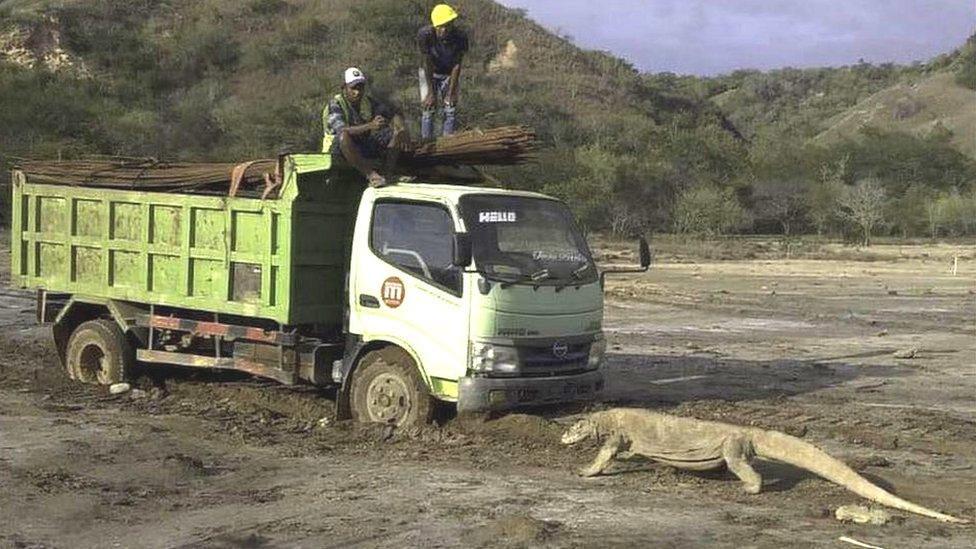
A Komodo dragon faces off with a truck during construction work in its remote habitat
This image of a Komodo dragon faced with a construction truck went viral in October.
It sparked a slew of concerns about the impact of a new tourist attraction dubbed "Jurassic Park", which is being built on a remote and undeveloped Indonesian island.
The site is one of a handful of Indonesian islands where the famed dragons - the world's largest lizards - are thought to have roamed for millions of years.
"This is the first time Komodos are hearing the roar of engines and the smell of smoke," wrote an activist that shared the photo. "Does anyone still care about conservation?"
The Indonesian government moved to reassure the public that no dragons would be harmed as part of their push to boost tourism on the island. But some environmentalists remain concerned about the changes being made to the dragons' ancient habitat.
Earlier this month local media reported that a construction worker was rushed to hospital, external by speedboat after a lizard bit him on the leg and hand, leaving him "seriously injured".
30 October 2020: The first same-sex couples joined a mass military wedding in Taiwan
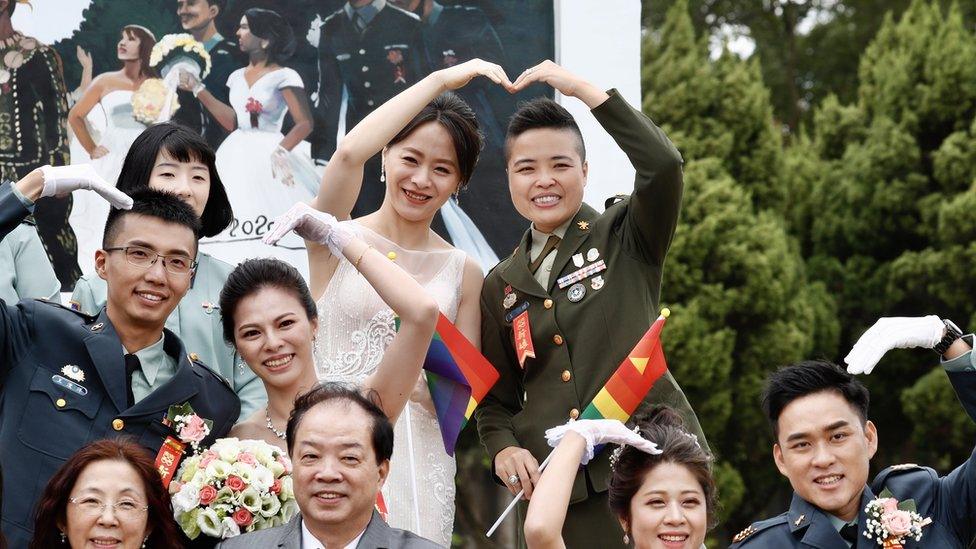
Wang Yi (top right) and Meng You-mei pose for the cameras
It was time to strike a pose and celebrate. On 30 October, for the first time ever, same-sex couples took part in a mass military wedding in Taiwan.
The historic moment came a year after the island legalised gay marriage - the only place in Asia to do so.
"We are hoping that more LGBT people in the military can bravely stand up, because our military is very open-minded. In matters of love, everyone will be treated equally," Chen Ying-hsuan, an army lieutenant who married Li Li-chen, told the Associated Press news agency.
They were one of two lesbian couples to tie the knot as part of a military ceremony that wed 188 couples in total.
Major Wang Yi and her wife Meng You-mei were the other pair, carrying a pride flag each throughout the ceremony.
Ms Meng's parents did not attend, but both Ms Wang's parents and her teacher came in support of the couple.
"I really feel this is a huge breakthrough for the military," Ms Wang's mother told AP. "Perhaps for heterosexual couples, it's just a [piece of] paper, but it's very important for gay couples."
17 November 2020: Inflatable rubber ducks became shields on the streets of Bangkok
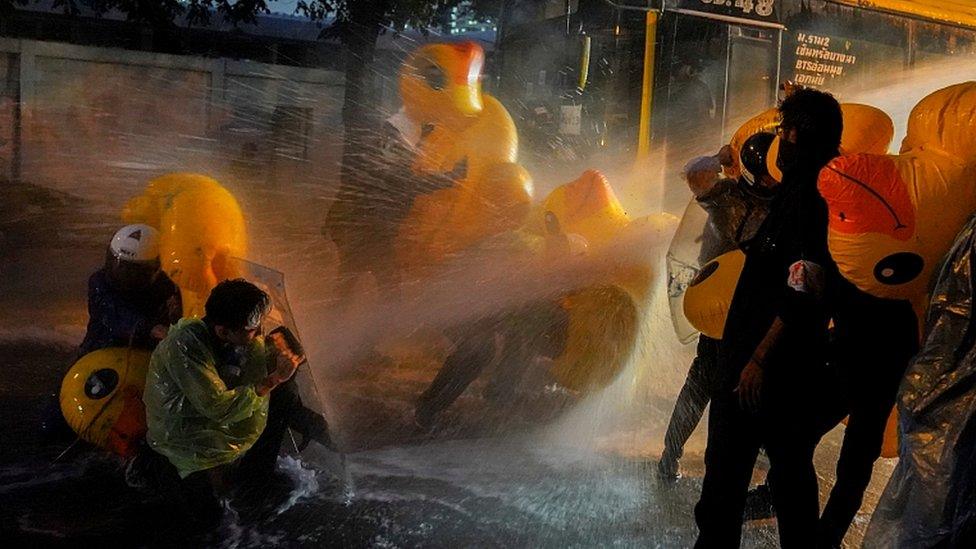
Democracy protesters used the pool ducks to defend themselves from water cannons
Thailand's youth-led democracy movement has become known for its creativity.
Few protest markers have been more surreal or colourful than the inflatable yellow rubber ducks that first appeared on Bangkok's streets in November.
They were only supposed to be a bit of fun, one activist told Reuters news agency.
But their debut at a rally outside the Thai parliament happened to coincide with the worst violence seen in the demonstrations since this latest wave began in July.
When police fired water cannons at protesters on 17 November they responded by deploying the ducks as impromptu shields.
The waterfowls proved more effective than umbrellas, noted one observer.
Thailand's young activists have been visibly inspired by their counterparts in Hong Kong who famously used umbrellas as a defence against water cannons.
But they've also been developing their own symbols and strategies.
At the rally the next day the ducks were out in force. They had fast acquired mascot status and have been spotted at several protests since.
27 November 2020: The image at the centre of India's farmer protests
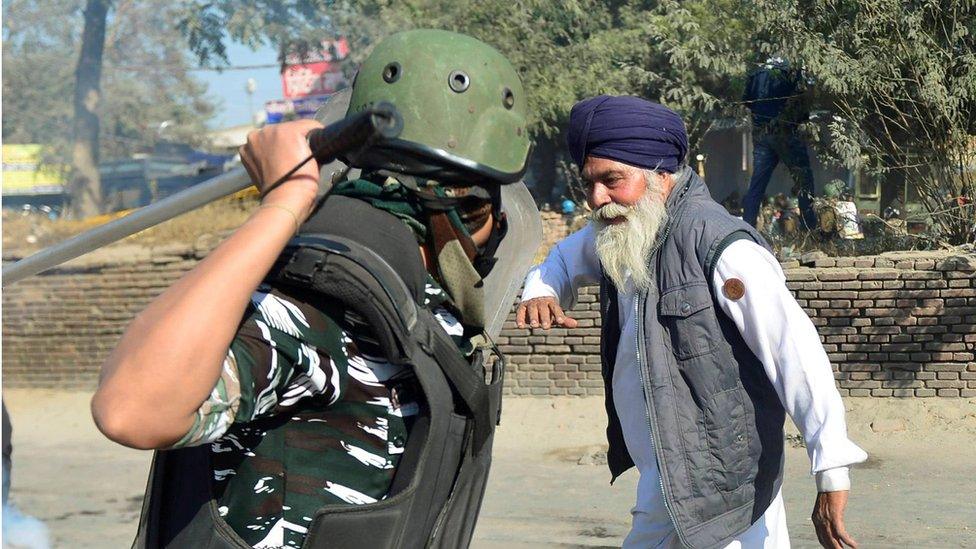
This photograph of a paramilitary policeman swinging his baton at an elderly and unarmed Sikh farmer has triggered huge debate in India.
It went viral on social media as hundreds of thousands of farmers staged angry demonstrations outside New Delhi against new agricultural laws.
It soon found itself at the heart of a political tussle too.
Opposition politicians highlighted the image to criticise the treatment of protesters, while the ruling Bharatiya Janata Party (BJP) claimed - falsely - that the farmer was not hit.
It wasn't long before Indian media tracked down Sukhdev Singh, the farmer pictured, who told them he had suffered multiple blows to his arms, back and calves.
A tweet trying to discredit the photo by the BJP's social media chief was later called out on Twitter - in what local press say was a first in India - as "manipulated media".
All images copyright.
- Published21 June 2020
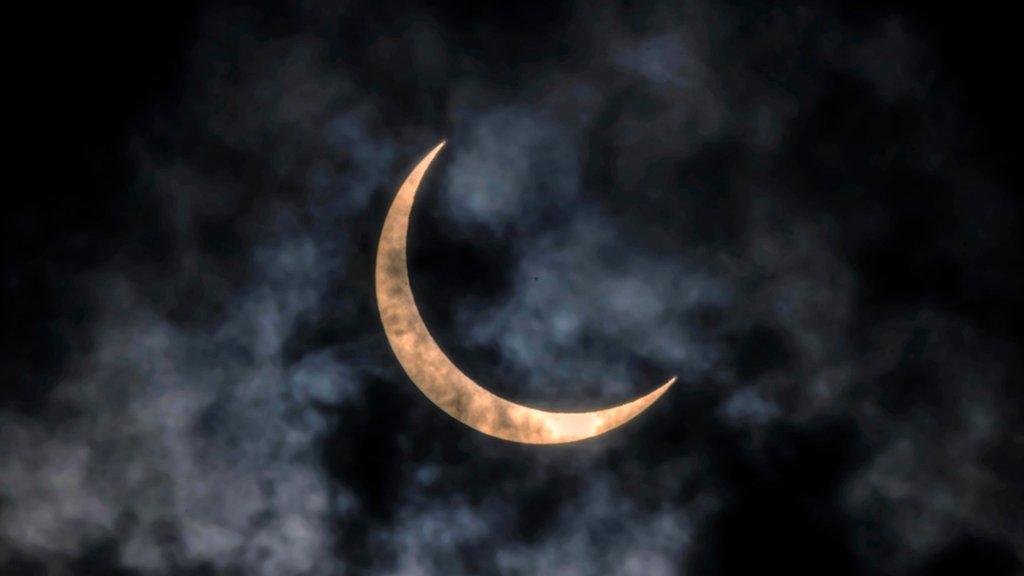
- Published18 August 2020
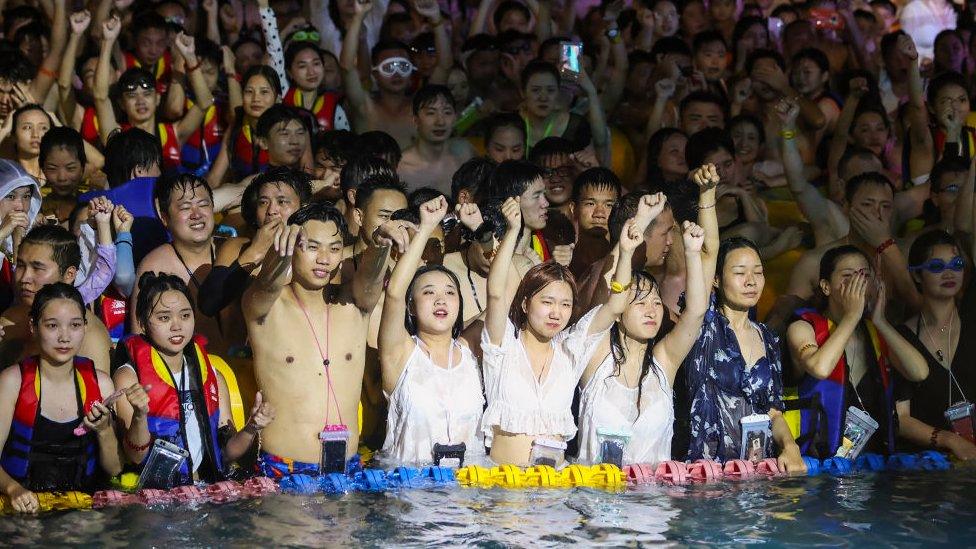
- Published2 December 2020
